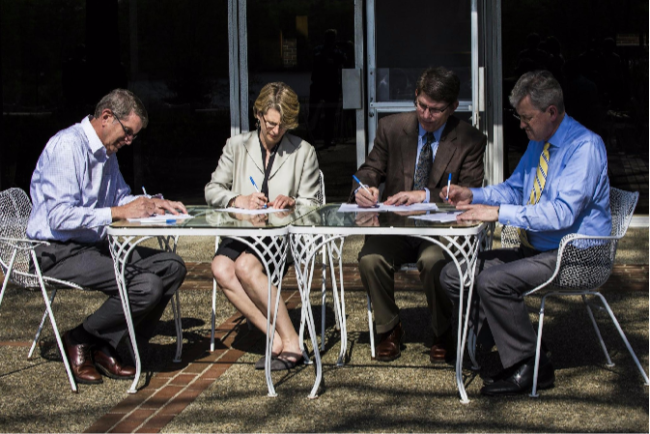You have /5 articles left.
Sign up for a free account or log in.

Officials at Colgate U and Davidson, Hamilton and Wellesley Colleges sign an agreement to form a consortium.
Wellesley College
The first four liberal arts colleges to join the massive open online course provider edX are forming a consortium to improve teaching both online and on campus.
Administrators, faculty members and staffers from the four colleges -- Colgate University, Davidson College, Hamilton College and Wellesley College -- met at Davidson’s campus in North Carolina in February to discuss a potential consortium. At a follow-up meeting Monday at Wellesley, a women’s college in Massachusetts, the colleges signed a memorandum of understanding forming the as yet unnamed consortium, laying the groundwork for closer collaboration between the liberal arts colleges.
Two schools of thought emerged from the February meeting, said Patrick Sellers, vice president for strategic partnerships and professor of political science at Davidson. The colleges could choose an “incremental” approach, identifying faculty members at the institutions whose interests overlapped and let them explore potential partnerships, or go “bold,” creating new courses that would enroll students at all four colleges taught by teams of faculty members.
The colleges have settled on the first approach for now, though the second option is not “off the table,” Sellers said. Together, the four colleges say they will share expertise and resources to produce high-quality online courses and content, including MOOCs, and explore how teaching online can benefit residential students.
“The goal here is to talk among like-minded institutions about the use of digital tools in general, when they are appropriate and how they can enhance our model -- the face-to-face student-faculty interaction on campus,” said Douglas N. Johnson, associate professor of psychology at Colgate, in upstate New York. The colleges are not looking to replace that model, he said, “but to use those tools to benefit that very valuable time that our students spend interacting with us.”
Beth Porter, vice president of product at edX, said the MOOC provider is interested in the liberal arts college consortium for three reasons. Like other MOOC providers, edX has a lineup of partners dominated by research universities. Supporting liberal arts colleges therefore gives edX an opportunity to explore the use of technology across a “large swath” of subject areas. Given the colleges’ strong focus on teaching, edX is also interested in seeing how they build communities and use digital content in face-to-face settings, she said.
“This is a really broad view that we don’t get from all our partners,” Porter said. “We would love to have more opportunities to work side-by-side with these schools to figure out how edX can help.”
The consortium will initially launch with two goals: to expand online learning at the four colleges and to help faculty members make sense of how students are learning online.
“Because of the [small] size of our faculty across our various institutions, we have to be really selective about how many of these [initiatives] we can do,” Johnson said. “Pooling our expertise, in terms of trying to do things that work with our liberal arts model, is really going to help all of us more quickly understand this space and how it’s going to be helpful for our faculty, students and the other constituents we are trying to reach.”
MOOCs, as the acronym suggests, are massive courses capable of enrolling hundreds of thousands of students at once, and they produce similarly massive amounts of data about learners. “Anything that a student clicks on or types in, there’s a record of that,” Sellers said. Saying it takes a "massive" effort to turn that data into useful information “would be an understatement,” he added.
Davidson, for example, has offered four MOOCs since joining edX in 2013. The courses have produced more than 8 million individual log events, Sellers said.
Larger universities often have research teams devoted to sorting through those kinds of data -- a task that, because of time or financial constraints, in some cases has fallen to the faculty members teaching the MOOCs at smaller colleges. One of the consortium’s first items of business is therefore to hire a data scientist whom the four colleges can share.
EdX, to avoid running into legal issues, makes its partner institutions responsible for all learner data. The MOOC provider merely serves as the “houser and protector” of the data, Porter said. She pledged edX’s support for the consortium, saying the MOOC provider “will enable anything that they want to have happen” to enable collaboration.
The consortium will showcase and distribute the content created by faculty members on an official website. As the collection grows, the website could become a repository for educational resources that faculty members at any of the four colleges could use in their courses.
The colleges are also putting out requests for proposals for faculty members interested in creating jointly taught courses, but they are still debating how best to do so. At this week’s meeting, a participant suggested the website could serve as a “dating site” where faculty members could post their interests and find potential collaboration partners.
“Teaching is a very intimate thing,” said Adam Van Arsdale, associate professor of anthropology at Wellesley. “When you’re sharing a classroom space -- whether that be a physical or digital space -- it requires some degree of comfort and personal knowledge. One of those goals of this collaboration is to provide venues for those personal connections to be established.”
The agreement signed by the four colleges on Monday only covers the creation of the consortium, and any expansion efforts -- such as hiring a data scientist -- will require new sets of agreements. The consortium will also approach different grant-making foundations to secure funding to follow expenses paid for by a planning grant from the Andrew W. Mellon Foundation, Sellers said.




